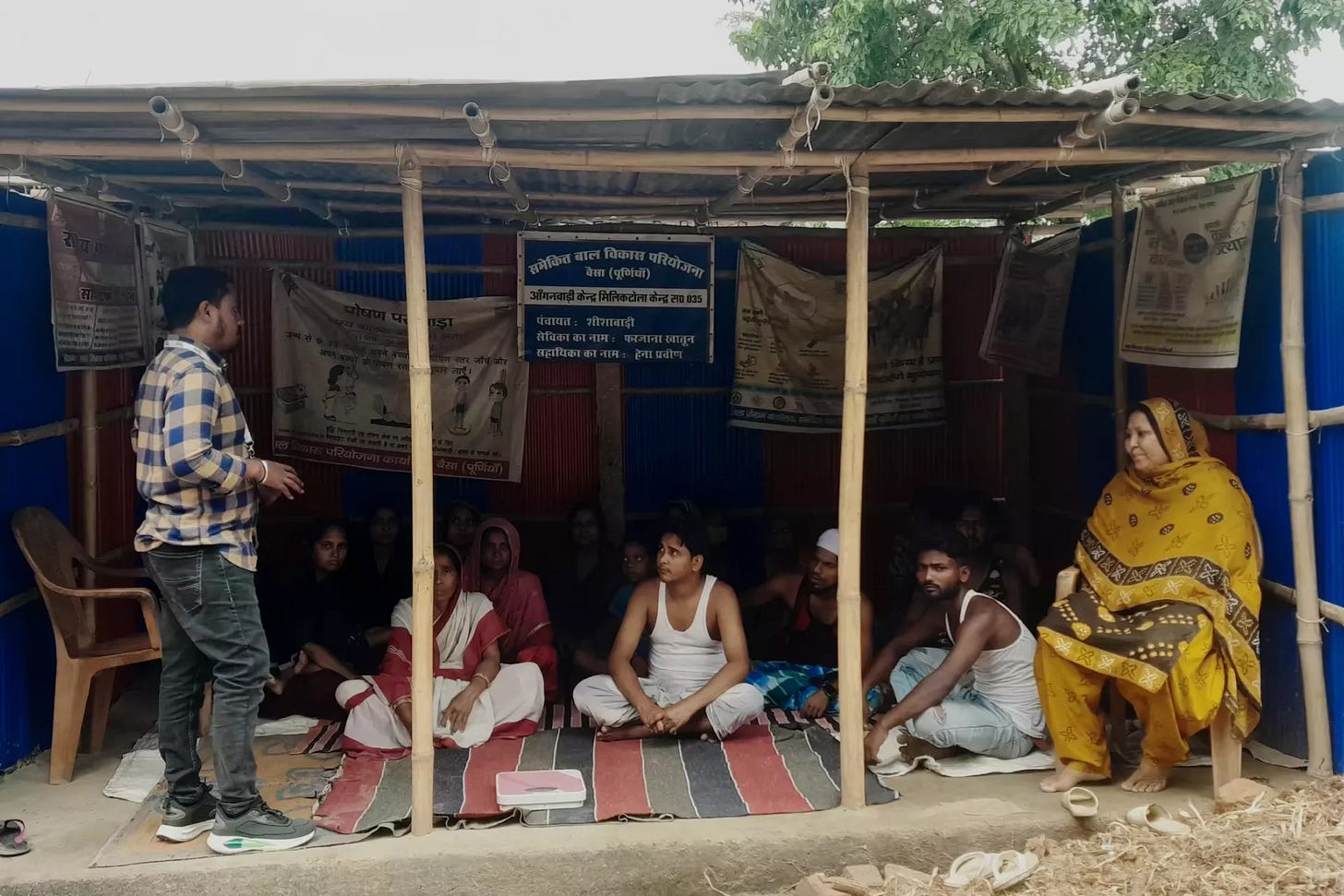From Silent Observers to Active Caregivers: Fathers Embrace Shared Parenting in Bihar
Fathers play a crucial role in childcare, fostering deeper parent-child relationships Author: Priyanka Kumari, SBC Officer, UNICEF Bihar Field Office
“Chanda mama aare aawa, pare aawa, nadiya kinare aawa, sona k katoriya mein doodh bhaat lele aawa, babuni k muh mein ghutuk.”
("Moon uncle, come fast and bring some milk and rice in a golden bowl and feed my daughter"), sings Uday Kumar Yadav softly as he feeds his six-month-old daughter, Disha, every night.
In the quiet village of Khokha Panchayat in district Purnea in the eastern Indian state of Bihar, this scene is not just tender, it is transformative. Uday, who runs a small coaching centre in his village, is part of a quiet revolution that challenges the deeply rooted norms of patriarchy where child-rearing has traditionally been seen as solely the mother’s domain.
“Growing up, I never saw my father involved in childcare or household work. I was raised to believe that a man’s role is to provide and protect, while women take care of the home and children,” Uday reflects.
But today, Uday’s perspective has shifted dramatically a change sparked by community engagement activities supported by UNICEF and local partners. It all began when, at the gentle persuasion of “Sevika Didi” (Anganwadi worker) and the local Panchayati Raj Institution (PRI) member, Uday attended his daughter’s Annaprashan ceremony, a community-based event (CBE) marking the introduction of complementary feeding.
“I wasn’t not very keen to attend at first,” admits Uday. “But that one event opened my eyes. I, along with many other fathers, learned about the importance of the first 1000 days of a child’s life and how even small acts of support to our wives can ensure our children get the right nutrition through breastfeeding and complementary feeding.”
A Community Mobilised for Change
Complementary feeding after six months is critical for a child’s growth and development. We need the collective efforts of family members, especially the involvement of both parents.
Recognising the need for a behavioural shift, UNICEF's Social and Behaviour Change (SBC) team, in partnership with the Nutrition team and local organisations, has been working extensively to involve men in childcare through community-based events, such as Godbharai (baby shower) and Annaprashan (baby’s introduction to solid food). The support of local PRI leaders has been instrumental in mobilising fathers, encouraging them to engage with the needs of their wives and children.
“During an orientation session for frontline workers, I learned about the significance of the first 1000 days,” shares Ravi Kumar, PRI member from Khokha Panchayat.
“Our Sevikas are doing a commendable job, but mobilising men is challenging. That is where I stepped in to encourage men in my village to attend these sessions. Slowly, we are seeing more fathers participating, and I am hopeful this will continue to grow, especially after the harvest season.”
Building a New Normal
The ripple effects of these efforts are becoming visible. Fathers who once saw themselves only as providers are now taking an active role in nurturing their children. They are learning about food diversity, selecting nutritious food items from the market, and sharing in the daily joys of parenting.

“Earlier, I would buy food according to my preferences. Now, after attending the community sessions, I consciously choose food that supports my wife’s and children’s health,” Chhotu Mahto, another father from the village, reflects on his own journey.
Local officials are also noticing the shift. “Previously, fathers were rarely seen at events like Annaprashan or even at routine health check-ups during Village Health, Sanitation, and Nutrition Days (VHSND),” shares Ms. Amrita Verma, CDPO, Sri Nagar. “Now, they not only attend but actively seek services and inquire about their children’s health and development. This change is the result of consistent community engagement supported by UNICEF.”

A Growing Brotherhood of Caregivers
What began with a few driven fathers is steadily evolving into a community-wide movement; a brotherhood of men who are redefining what it means to be a father.These engagements in Purnea are fostering a social capital of fathers who are emotionally connected to their children, actively supporting their wives, and contributing to more equitable households. The simple act of Uday singing a lullaby to his daughter each night is no longer just a song, it is the sound of change echoing through the lanes of Bihar.
Note: This story was originally published on UNICEF’s website.
Have stories, insights, or case studies on health, nutrition, WASH, child protection, or social behaviour change? We would love to hear from you. Reach out at arpita.d@zealgrit.com.
To join Poshan Ghar, click here and be a part of a diverse and dynamic community!
Follow Poshan Ghar on LinkedIn, Facebook, Twitter, Instagram, and YouTube.
P.S. Enjoying this content? Subscribe directly to receive future updates by clicking below.




